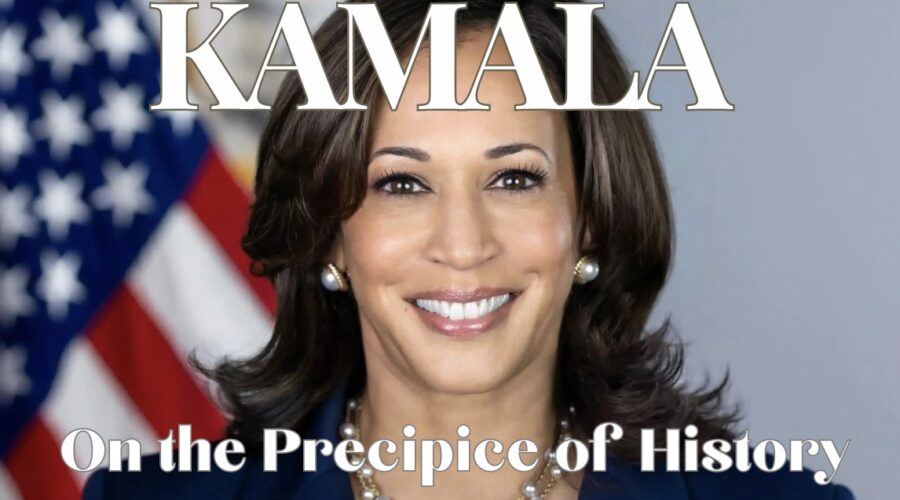Vice President Harris stands on the threshold of history to become not only the first woman but also the first Black woman elected President of the United States but facing a country experiencing its most profound divisions since the Civil War, with ethnic and cultural strife and an alarming rise in racist, anti-Black hate groups.
By TONY CASTRO
The 2024 presidential election has taken an unprecedented turn with Vice President Kamala Harris poised to become the Democratic nominee following President Joe Biden’s decision to step down — and facing a challenge unlike any in the nation’s 248 years.
Harris stands on the precipice of history, with the potential to become not only the first woman but also the first Black woman elected President of the United States.
But this potentially landmark moment comes at a time when the country is experiencing its most profound divisions since the Civil War, characterized by ethnic and cultural strife and an alarming rise in racist, anti-Black hate groups.
“The racism and sexism toward Harris isn’t shrouded,” says Fordham professor Christina Greer, author of Black Ethnics: Race, Immigration, and the Pursuit of the American Dream. “It’s blatant. With Trump at the helm, Republicans have learned that parroting his racist and sexist language is a way to appeal to their base.”
The attacks from critics against Harris based on race and qualifications began even as President Biden was weighing his decision not to run.
The headline of a recent New York Post column deriding Vice President Kamala Harrisread , “America may soon be subjected to the country’s first DEI (diversity, equity and inclusion)president.” Rep. Chip Roy, R-Texas, used that same language, telling Fox Business that Democrats have “got to choose between a mentally incompetent president and a DEI vice president.”
At a speech at Trump National Doral Golf Club in Florida on Tuesday night, former President Donald Trump said: “If Joe had picked someone even halfway competent, they would have bounced him from office years ago. But they can’t, because she’s got to be their second choice.”
And it is just starting, raising the ante on what is that stake. But Harris is no stranger to the attacks. Earlier this year she said clearly that the U.S. has racism in its history, bucking remarks to the contrary from then GOP presidential candidates Nikki Haley and Florida Gov. Ron DeSantis.
“There is no denying that we have, in our history as a nation, racism,” Harris said in an ABC News interview in January. “I think we all would agree that while it is part of our past, and that we see vestiges of it today, we should also be committed collectively to not letting it define the future of our country.”
A Harris presidency would represent a watershed moment in American history. Her election as the first woman and the first Black woman president would be a powerful symbol of progress and inclusivity.
It would inspire future generations of women and people of color to pursue leadership roles and continue the fight for equality.
Kamala Harris’s potential election as President of the United States represents a historic opportunity to break barriers and advance the cause of justice and equality.
However, the challenges she faces are formidable, given the current political climate marked by division and racial strife. Drawing on historical parallels, implementing a comprehensive policy platform, and effectively engaging the electorate will be crucial to her success.
Harris’s campaign embodies the aspirations of a diverse and evolving America, and her presidency could pave the way for a more inclusive and equitable future.
The political climate in the United States is marked by extreme polarization. The divisions are not only along political lines but also deeply rooted in race, ethnicity, and culture. The resurgence of white nationalist groups and the increasing visibility of systemic racism have exacerbated tensions.
This environment poses significant challenges for any presidential candidate, particularly one from a minority background. Harris’s campaign will have to navigate these turbulent waters, addressing both the aspirations and anxieties of a divided electorate.
The United States is experiencing a period of intense ethnic and cultural conflict. The Black Lives Matter movement and the subsequent backlash from various quarters of society underscore the deep-seated racial tensions.
The rise of anti-Black hate groups has further inflamed these divisions.
According to the Southern Poverty Law Center, there has been a significant increase in hate groups and hate crimes over the past decade. This hostile environment presents a daunting challenge for Harris as she seeks to unite a fractured nation.
Looking back at American history, the presidencies of Abraham Lincoln and John F. Kennedy offer valuable insights into leadership during times of division.
Lincoln, who led the nation through the Civil War, emphasized unity and the moral imperative of equality. His leadership style, characterized by empathy and resilience, provides a model for Harris.
Similarly, Kennedy’s approach during the civil rights movement highlights the importance of advocating for justice and equality, even in the face of fierce opposition. Harris can draw on these historical lessons as she navigates her path to the presidency.
Kamala Harris’s background is emblematic of the American multicultural narrative.
Born to an Indian mother and a Jamaican father, Harris has navigated multiple cultural identities throughout her life. Her career in public service began as a prosecutor, eventually becoming the first Black woman to serve as Attorney General of California.
Elected to the U.S. Senate in 2016, Harris quickly made a name for herself as a formidable legislator and advocate for justice reform.
Her selection as Joe Biden’s running mate in 2020 was a historic choice, reflecting the Democratic Party’s commitment to diversity and inclusion.
In his 2020 speech announcing Harris as his vice presidential pick, Biden said, “This morning, all across this nation little girls woke up — especially little Black and brown girls who so often may feel overlooked and undervalued in our society — but today, maybe they’re seeing themselves for the first time in a new way: as the stuff of presidents and vice presidents.”
The journey of women in American politics has been long and arduous. The 19th Amendment, ratified in 1920, granted women the right to vote, marking a pivotal moment in the struggle for gender equality.
However, it took decades for women to gain significant political representation. The election of Geraldine Ferraro as the first female vice-presidential candidate on a major party ticket in 1984 and Hillary Clinton’s nomination as the first female presidential candidate of a major party in 2016 were significant milestones.
Harris’s nomination and potential election represent the culmination of these efforts, signaling a transformative moment in American politics. Still, the vice president has also repeatedly acknowledged the impacts of the history of racism in the U.S. on the present day.
“I’m Black, and I’m proud of being Black,” she said in interviews during her 2019 presidential campaign. “I was born Black. I will die Black, and I’m not going to make excuses for anybody because they don’t understand.”
TONY CASTRO, the former award-winning Los Angeles columnist and author, is a writer-at-large and the national political writer for LAMonthly. org. He can be reached at tony@tonycastro.com.





